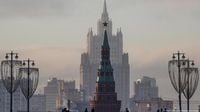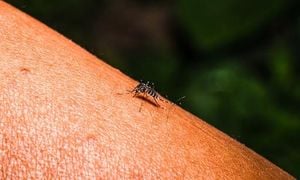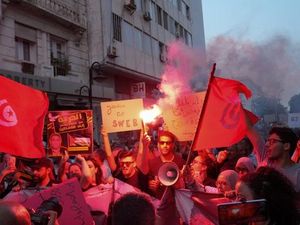On July 26, 2025, Russia's upper house of parliament approved a sweeping new censorship law that punishes individuals for searching online content officially branded as "extremist." The legislation, which awaits President Vladimir Putin's signature to become law, marks a significant expansion in the Kremlin's control over the internet and free expression.
The law introduces fines of up to the equivalent of $64 for anyone caught deliberately searching for or accessing extremist materials online. Previously, Russian authorities required some form of engagement with banned content—such as posting critical comments on social media—to levy penalties. Now, even the act of searching is criminalized.
Alongside this, the legislation imposes penalties for promoting virtual private network (VPN) services, which many Russians rely on to circumvent government censorship and access blocked information. The Kremlin has long sought to close loopholes that allow citizens to bypass its strict online controls, and this law further tightens restrictions.
Valentina Matvienko, Speaker of the Russian Federation Council, defended the bill's purpose. She emphasized that the law targets extremists and is designed to ensure national security, stating, "So that people understand that this law will never affect a single conscientious citizen. That it is aimed at ensuring the security of the country, the fight against extremism." However, critics argue that the law's broad and vague definitions could ensnare ordinary citizens and dissenters alike.
The official definition of extremist activity in Russia is notoriously expansive, encompassing groups such as the Anti-Corruption Foundation founded by the late opposition leader Alexei Navalny, and even the "international LGBT movement." The Justice Ministry maintains a blacklist of over 5,000 entries, including flyers, books, films, songs, and online content. This list is not limited to hate speech or incitement but also includes works critical of the government.
For example, the 2002 book "Lubyanka Criminal Group" by Alexander Litvinenko, a former Federal Security Service officer who defected to the West, is on the list. The book alleges that Russian security services orchestrated terrorist attacks in Moscow in 1999 to bolster Vladimir Putin's rise to power. Additionally, materials from the Jehovah's Witnesses, a religious group banned as extremist since 2017, are included.
Since Russia's full-scale invasion of Ukraine in February 2022, the Kremlin has dramatically escalated its crackdown on dissent and free speech. Independent news outlets and human rights groups have been shut down, labeled "foreign agents" or "undesirable," and hundreds of activists and critics face criminal charges. In the spring of 2025 alone, the Russian Investigative Committee reported opening 605 cases under new criminal code articles targeting the spread of "fake news" about the military and "discrediting" the armed forces.
The human rights organization Memorial reported that by the end of 2024, at least 10,000 political prisoners were detained across Russia. Experts warn that the new law will only increase the number of people punished for exercising free speech, as even searching for certain online content could be deemed criminal.
The law's passage sparked rare public protests outside Russia's parliament. One demonstrator held a sign reading, "For a Russia without censorship. Orwell wrote a dystopia, not a manual," referencing the classic 1949 novel "1984," which warns against totalitarian oppression. That protester was quickly detained. Boris Nadezhdin, a liberal politician barred from running in the 2024 presidential election, described the law as "already close to thoughtcrime," highlighting the chilling effect of banning even the act of searching the internet.
Margarita Simonyan, editor-in-chief of the state-controlled broadcaster RT, voiced her concerns on social media. She lamented that the law would hinder her ability to investigate and "shame" extremist organizations, underscoring how even Kremlin-aligned figures see the law's potential to stifle information.
The law also raises questions about enforcement. Officials claim it targets only those who systematically seek banned content, not casual internet users, but offer no clear criteria for what constitutes systematic searching. Sergei Boyarsky, deputy head of the State Duma from the ruling United Russia party, reassured citizens that fines would not apply to using Meta's social networks or searching for materials by individuals labeled extremists. Still, experts remain skeptical.
Dmitry Zair-Bek, head of the human rights legal project Pervy Otdel, warned that enforcement will depend heavily on individual police officers' discretion, potentially leading to arbitrary punishments. Increased phone inspections at borders and surveillance are likely, mirroring practices in neighboring Belarus, where police routinely check citizens' phones and punish subscriptions to banned channels on platforms like Instagram and YouTube.
In Belarus, censorship extends into physical spaces, with authorities demanding phone checks on trains and in student dormitories, making refusal nearly impossible. Dmitriy Navosha, co-founder of the international online sports publisher Tribuna.com, recounted how his site was labeled extremist after he criticized Belarusian strongman Alexander Lukashenko and the violent crackdown on protesters in 2020. Visitors risk punishment simply for viewing the site.
Russia's list of banned extremists and terrorists has grown to include dozens of prominent writers, musicians, journalists, and bloggers critical of the war in Ukraine. Meta, the parent company of Facebook and Instagram, was declared extremist in March 2022 after allowing posts endorsing violence against Russian soldiers, which Moscow labeled "Russophobia."
The new censorship law signals a further tightening of the Kremlin's grip on information and public discourse, transforming even private online searches into potential criminal acts. As President Putin prepares to sign the bill into law, the boundaries of free expression in Russia continue to shrink, raising alarms among rights advocates and citizens alike about the future of digital freedom in the country.




